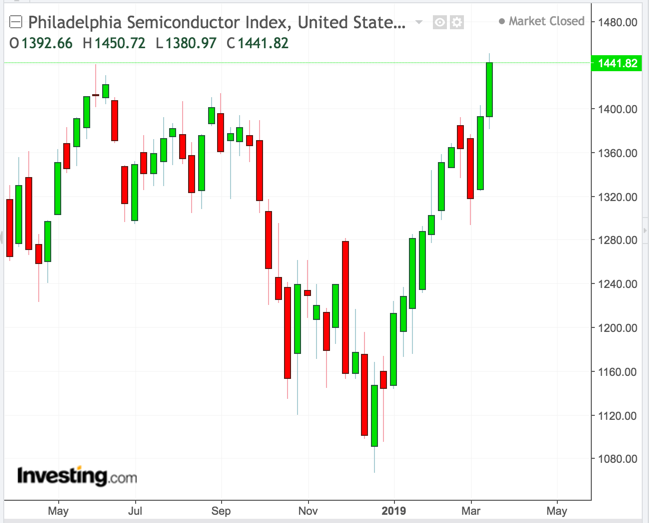It didn’t take much to see a turnaround in one of the worst-performing sectors in the technology space last year.
Shares of chipmakers, that benefited from the exploding use of smartphones, cloud computing, and huge investment in data centers by the world’s largest tech companies, are regaining their lost ground fast this year with some of the stocks on their way to post their best first-quarter gains in more than two years.
NVIDIA (NASDAQ:NVDA), the industry's biggest maker of chips for computer graphics cards, has surged 28% so far this year, while Advanced Micro Devices (NASDAQ:AMD), has seen its stock rallying more than 36%.
The benchmark PHLX Semiconductor Index has posted gains of more than 26% in 2019, outpacing the S&P 500’s 14% surge. This fast and powerful rally in chip stocks is causing confusion among investors, as many of the negative factors that sent these shares tumbling last year are still lurking.

For example, the U.S. and China are still working through a trade deal that may not shape up the way the markets are expecting. U.S. President Donald Trump said yesterday he doesn’t plan to do away with trade tariffs on China until he's sure Beijing is fully complying with any possible trade deal.
Semiconductor companies have a major portion of their growth tied to China, where spending on gaming and artificial intelligence has fueled demand for their products. A slowing global economy, especially a more pronounced slowdown in China, will continue to keep demand under pressure this year. The S&P 500 semiconductor group is forecast to report a 24% drop in first-quarter profits from a year earlier, compared with a 3.6% decline expected for the S&P 500, according to FactSet.
Chipmakers’ Powerful Rebound
One possible explanation of chipmakers’ powerful comeback is that some companies have rekindled hopes of an early recovery after producing better than expected fourth-quarter earnings and predicting strong demand for their products. AMD, the second-largest maker of computer processors, reported profit for Q4 that met analysts’ expectations and predicted a positive outlook for 2019.
Some investors found a good reason to buy Nvidia shares after the company didn’t perform worse than analysts’ expectations after an earlier warning by Chief Executive Jensen Huang, who saw Q4 producing “a real punch in the gut.”
Despite this impressive rebound, we continue to remain doubtful about the sustainability of this rally. Investors shouldn’t forget that the global economy still remains vulnerable and hostage to the U.S-China trade negotiations. A scenario where demand could revive quickly for chip producers is too optimistic.
Buying shares of Nvidia and AMD, the two leading gainers this year, also carries additional risks for long-term investors, given the highly cyclical nature of their products and too much volatility in their share values. Nvidia, for example, lost more than half of its market value between October and December last year on signs that its two main markets, gaming and data centers, are slowing down.
If you want to take a position in the semiconductor sector, then we find Intel Corp (NASDAQ:INTC). a more sustainable long-term bet. With a forward price-to-earnings multiple of around 11, close to the lowest ratio since 2015, and a dividend yield of about 2.33%, Intel looks appealing for long-term investors.
In our view, Intel enjoys greater power to sustain prolonged weakness in demand with a market share of about 99% for memory chips that run servers, the machines that companies and individuals need to run internet and large networks.
Bottom Line
Investing in chip stocks after a powerful relief rally doesn’t make sense, especially when threats to their growth haven’t fully subsided yet. Any negative development on the U.S.-China trade negotiations, more bad news on the Chinese economic front, and a possible slowdown in the U.S. expansion are some of the headwinds that call for avoiding semiconductor stocks in general. That said, we find Intel stock offering a better risk-reward preposition for long-term investors than highly cyclical Nvidia and AMD stocks.
